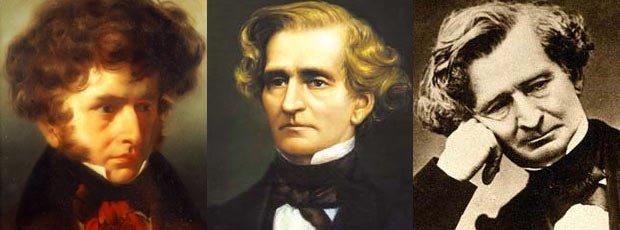His heart on his sleeve, fanatically dedicated, disillusioned, bushy-haired—Berlioz was the archetypal Romantic composer. He composed mostly large-scale orchestral and choral works.
Vital Statistics
Born:
Dec. 11, 1803, La Côte-Saint-André, near Grenoble
Died:
March 8, 1869, Paris
During Lifetime:
Typical French turmoil—Napoleon, the Restoration of the Bourbon kings, the July Revolution of 1830, the 1848 democratic revolution and the coup of its premier, Louis Napoleon, who crowned himself Emperor Napoleon III and ruled Second Empire France.
Biographical Outline
Queasy : At 18, Berlioz is pressured by his physician father to attend medical school. He tries it but recoils at the “hideous corpses, the screams of patients, the groans and rattling breath of the dying!” By 1826 he starts studies at the Paris Conservatoire de Musique.Third time is the charm, 1830 : On his third attempt, Berlioz wins the Prix de Rome in 1830, the highest composition prize at the Conservatoire, officially launching his career as a composer.Hopeless Romantic, 1827 : Berlioz falls in love with Harriet Smithson, an Irish actress playing the part of Ophelia in Hamlet. Berlioz composes the Symphonie Fantastique (1831) as an expression of his obsessive passion for her. They marry in 1833, despite a language barrier, and separate eight years later. Critic and composer, 1830s : Despite composing a number of brilliant works in the 1830s, he was forced to rely on writing music criticism to earn money. Through an unexpected, large gift from the violin virtuoso, Niccolo Paganini, Berlioz is able to pay his debts and write his powerful symphonic work Romeo et Juliette (1839).Conductor, 1835 and beyond : From 1835 on, Berlioz conducts all his own concerts, forging a career as one of the first specialized conductors, in wide demand for his interpretive skills. Throughout the 1840s and 1850s he tours Europe, and publishes a treatise on orchestration (1843), the first book of its kind. Paris remains unfriendly to him, and the failure of his opera-oratorio, Le damnation de Faust (1846) wounds him deeply.Grand opera, 1858 : Berlioz gives up concert tours for two years to complete Les Troyens, his grand opera treatment of Virgil’s Aeneid. It is not staged until 1863, at the Theatre Lyrique. Divided into two evenings, this epic work is a success, although the theater’s impresario still cuts large parts in later performances.Last years : Disillusioned and ailing, Berlioz manages to complete his memoirs but largely stays away from music and concerts. The death of his son Louis, of yellow fever in Havana, is a terrible blow, and Berlioz dies less than two years later.
Fun Facts
Jack of all trades: Berlioz was somewhat proficient as a guitarist and flautist, but did not excel at any one instrument—a rarity for famous composers. This was a liability but also an advantage, giving him a unique approach. Uncompromising: Sincerity as ardent as Berlioz’s resulted in an unwillingness to compromise. A contemporary wrote: “Few were at ease in his company.” Heavy reader: Berlioz loved literature. He quoted freely and frequently from Shakespeare, Goethe, and the Latin and Greek classics. In his own words: “Love cannot express the idea of music, while music may give an idea of love”
Recommended Biography
David Cairns, Berlioz (2 vols.) Vol 1: The Making of An Artist (Penguin, rev. 1999) Vol 2: Servitude and Greatness. (Penguin, 2000). Hector Berlioz, The Memoirs of Hector Berlioz, trans. by David Cairns (Everyman's Library, Random House, 2002.) Not entirely reliable, but a great read. Peter Bloom, The Life of Berlioz. Musical Lives (Cambridge, 1998).
Explore the Music
Berlioz wrote almost exclusively for the orchestra. Unlike his contemporaries he wrote nothing for solo piano and practically no chamber music.
Recommended Websites
La damnation de Faust
(Legende dramatique en quatre parties (German/French)). By Hector Berlioz (1803-1869). Edited by Julian Rushton. Arranged by Eike Wernhard. For voice soli/choir/children's choir/orchestra. This edition: Urtext edition. Level 4. Piano reduction (paperbound). Language: German/French. Hol. 111. Published by Baerenreiter Verlag (BA.BA5448-90)
...more info
Recordings
Orchestral works: Symphonie Fantastique—a perfect example of Romantic program music (also called “tone poem”—music that is based on a story or idea rather than being music for its own sake) Roman Carnival Overture Choral works:
